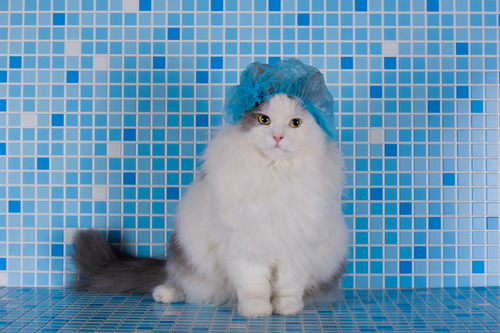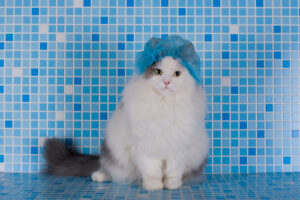Cats are mysterious creatures, and one of the quirks that puzzles many pet owners is their strong dislike for water. While some cats will cautiously dip a paw in a sink or play with a dripping faucet, most will avoid baths or swimming at all costs. If you’ve ever asked yourself, “Why do cats hate water?”, you’re not alone. This behavior has roots in feline evolution, physiology, and behavior patterns. In this blog, we’ll explore the reasons behind cats’ aversion to water, how it relates to their history, and what this means for you as a cat owner. If you ever have questions about your cat’s behavior or health, the team at Boulder Veterinary Hospital is here to help. Call us at (303) 442-6262 or book an appointment online to speak with a veterinarian who understands cats.
The Evolutionary Roots of Cats and Water
To understand why cats hate water, it helps to look back at where domestic cats come from. Unlike many dog breeds that were bred to hunt, swim, or retrieve in water, cats have ancestors that lived in dry, desert environments.
Desert Origins
Domestic cats trace their lineage back to the African wildcat, a species that thrived in arid regions with little exposure to large bodies of water. Because survival in those environments didn’t depend on swimming, cats never developed the instinct to embrace water.
Lack of Necessity for Water Survival
Predators that evolved in areas with lakes or rivers, such as tigers or certain dog breeds, often became skilled swimmers out of necessity. Cats, however, developed hunting strategies on land such as stalking rodents and birds, so water never became part of their survival skills. This evolutionary background explains part of why cats hate water today.
Cats and Their Unique Coat Structure
Another reason why cats hate water lies in their fur. Unlike animals that have water-resistant coats, most domestic cats are not designed to repel moisture.
Heavy and Uncomfortable When Wet
When a cat’s fur becomes soaked, it grows heavy, making the cat feel weighed down and vulnerable. This sensation can trigger stress since cats rely on agility and speed to feel safe.
Loss of Body Heat
Wet fur also fails to insulate a cat’s body. Because cats are naturally warm-blooded and prefer cozy environments, being wet makes them cold and uncomfortable. This physical discomfort reinforces the negative association with water.
The Behavioral Side of Cats and Water
Cats are naturally cautious creatures, and this caution extends to water. Their dislike is not just physical but also behavioral.
Sensory Sensitivity
Cats are highly sensitive to changes in their environment. The feel of water on their skin and fur is foreign and overwhelming. Many cats also dislike the noise of running water, which can heighten stress.
A Sense of Control
Cats value control over their surroundings. When placed in water, they lose traction, stability, and control, which can make them anxious. This lack of control plays a large role in why cats hate water.
Why Some Big Cats Love Water
It may seem confusing that domestic cats avoid water while some big cats, like tigers and jaguars, enjoy swimming. The difference lies in their environments and adaptations.
Adaptations in Big Cats
Tigers often live in hot, humid regions, where swimming cools them off. Their bodies are also more physically suited to water, with stronger muscles and water-resistant coats.
Contrast with Domestic Cats
Since domestic cats do not share the same evolutionary adaptations, water feels more threatening than refreshing. This comparison highlights how environment and evolution shape animal behavior.
Exceptions: Cats Who Do Like Water
Not every cat dislikes water. While the general rule is that cats avoid it, some breeds and individuals will break the stereotype.
Breeds Known for Water Play
Certain breeds, such as the Turkish Van, are more comfortable with water and even enjoy swimming. Their coats are slightly more resistant to water, making the experience less uncomfortable.
Individual Personality Differences
Just as people have different preferences, some cats are naturally curious about water. These cats may paw at water bowls, sit near sinks, or tolerate baths better than others. Even so, these cats are in the minority, and their behavior doesn’t change the overall trend of why cats hate water.
Water and Grooming: Why Cats Don’t Need Baths
Another reason cats rarely need to interact with water is because of their grooming habits.
Self-Grooming Behavior
Cats spend a significant portion of their day grooming themselves. Their tongues are equipped with tiny, hook-like structures that clean fur efficiently, reducing the need for baths.
When Water May Be Necessary
While most cats don’t require regular bathing, situations like exposure to harmful substances, skin issues, or veterinary recommendations may call for water-based cleaning. If your cat ever faces one of these situations, your veterinarian can guide you through safe options.
Tips for Helping Cats Around Water
For pet owners who occasionally need to introduce their cats to water, understanding why cats hate water is essential.
Gradual Introduction
Instead of forcing a cat into water, start by introducing them to damp cloths or shallow water bowls. Slow, positive exposure may reduce anxiety.
Provide Positive Associations
Rewarding calm behavior near water with treats or praise can build a more positive connection. Over time, this can help reduce stress when water exposure is necessary.
How Boulder Veterinary Hospital Supports Cat Care
While most of the time you don’t need to worry about bathing your cat, you might still wonder about their grooming, health, or behavior. That’s where veterinary care comes in. At Boulder Veterinary Hospital, our team understands cat behavior and can answer your questions about why cats hate water, as well as other unique feline traits. We provide preventive care, wellness exams, and guidance on your cat’s overall well-being. Call us at (303) 442-6262 or schedule an appointment online for personalized support.
Cats, Water, and the Mystery of Feline Behavior
So, why do cats hate water? The answer lies in a mix of evolutionary history, coat structure, sensitivity, and personality differences. While a few cats may defy the stereotype, most will always prefer staying dry. As a cat owner, understanding this aversion can help you respect your cat’s instincts and manage their environment with care. If you have questions about your cat’s habits, health, or unique personality, reach out to Boulder Veterinary Hospital. Call (303) 442-6262 or book an appointment online today. We’re here to support your cat every step of the way.





